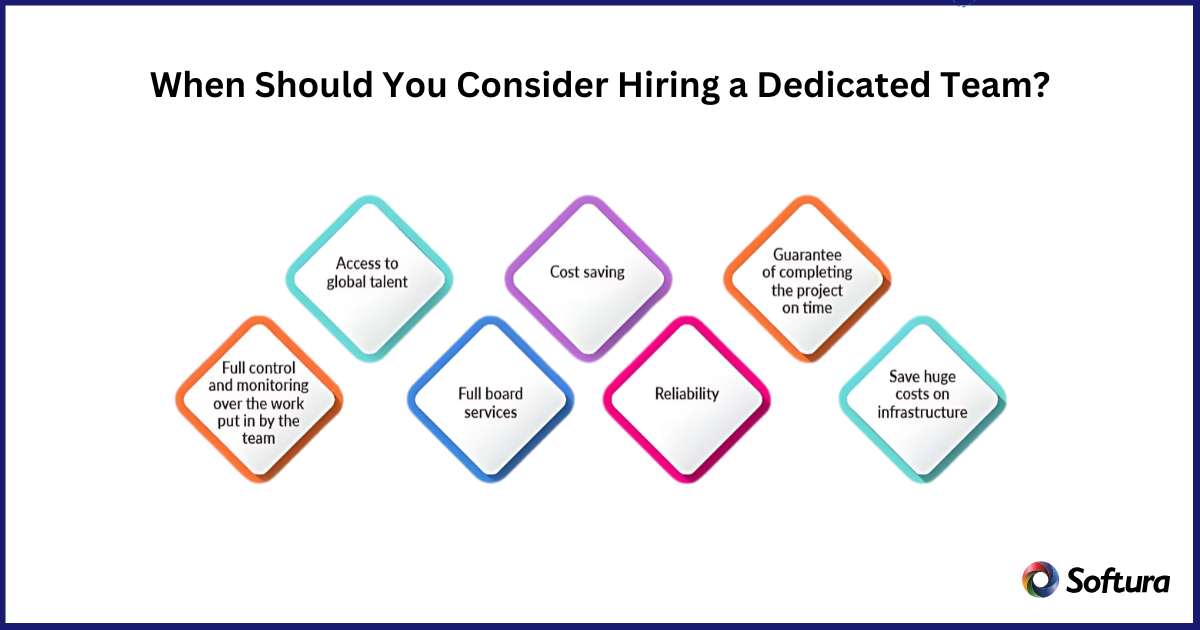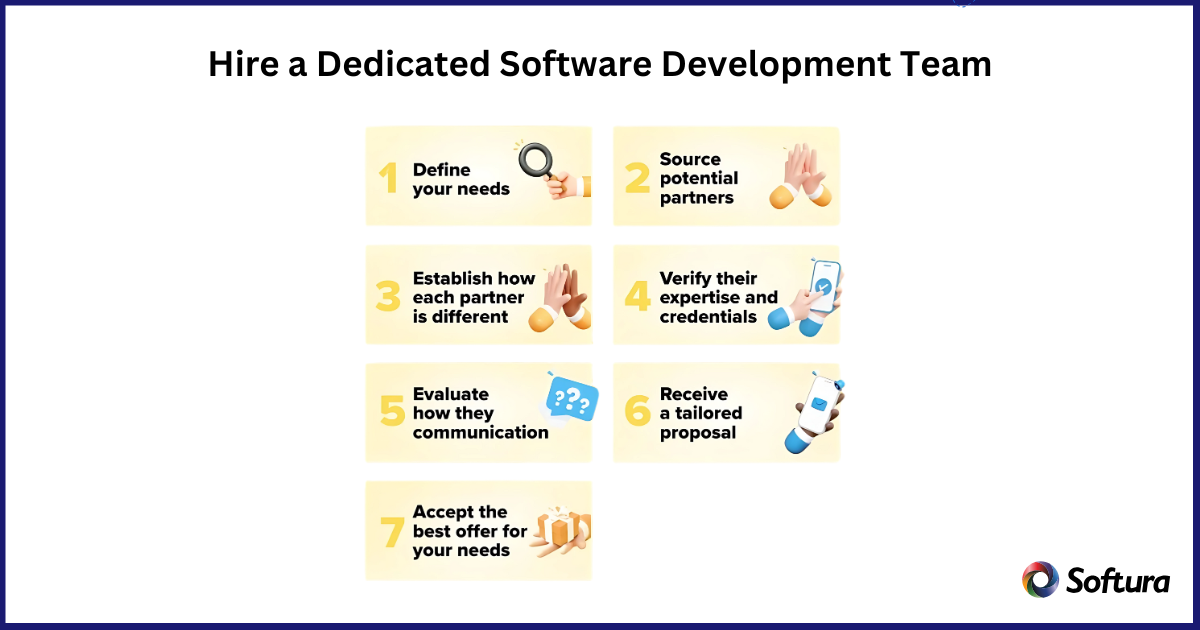"Our integration with the Google Nest smart thermostats through Aidoo Pro represents an unprecedented leap forward for our industry."
- Antonio Mediato, founder and CEO of Airzone.
Imagine this: You’ve got a groundbreaking app idea or a game-changing software concept. But building it requires more than just an idea—it needs skilled developers, designers, and project managers working together. That’s where a dedicated software development team comes in.
A dedicated team is like your own personal squad of tech superheroes. Unlike hiring freelancers or relying on your in-house team, a dedicated software development team is handpicked to focus solely on your project. They work exclusively for you, just like an extension of your company, ensuring they understand your goals, processes, and vision. It’s almost like having your dream team of experts—but without the hassle of hiring them full-time.
So, why go this route? Couldn’t you just stick with freelancers or hire an in-house team? Let’s break it down.
Think about it like this: when you hire freelancers, you’re getting individuals who are juggling multiple projects. That means they might not always prioritize your needs. On the other hand, building an in-house team is great but comes with challenges like recruitment costs, training, and overhead expenses.
A dedicated team offers the best of both worlds. You get a group of experts who are fully committed to your project, but without the long-term commitments of an in-house hire. Plus, they often come pre-vetted with a proven track record—saving you time and stress. Whether you’re a startup working on your MVP or a scaling company with a big project, a dedicated team gives you flexibility, focus, and cost-effectiveness.
"Our integration with the Google Nest smart thermostats through Aidoo Pro represents an unprecedented leap forward for our industry."
- Antonio Mediato, founder and CEO of Airzone.
Hiring a dedicated team isn’t just a buzzword—it’s a game-changer. Here’s why:
It’s like having a well-oiled machine at your disposal. All you need to do is guide them—and watch your project take shape.

"By analyzing the data from our connected lights, devices and systems, our goal is to create additional value for our customers through data-enabled services that unlock new capabilities and experiences."
- Harsh Chitale, leader of Philips Lighting’s Professional Business.
Not every project calls for a dedicated team, so when does it make sense? Let’s look at some examples.
"By analyzing the data from our connected lights, devices and systems, our goal is to create additional value for our customers through data-enabled services that unlock new capabilities and experiences."
- Harsh Chitale, leader of Philips Lighting’s Professional Business.
Ready to hire your dream team? Here’s a step-by-step guide to make the process smooth and successful:
Define Your Project Requirements
Start with clarity. What do you want to build? Outline your goals, timelines, and budget. Be as specific as possible—what features do you need? What tech stack are you using? Think of this as your roadmap; without it, even the best team can’t help you reach your destination.
Research and Shortlist Potential Vendors
Now comes the fun part—hunting for the perfect team! Look for companies with a solid track record in your industry. Check their portfolios, client reviews, and case studies. Pro tip: platforms like Clutch and GoodFirms are great for finding top-rated vendors.
Evaluate the Team’s Skills and Experience
Once you’ve narrowed your list, dig deeper. What technologies are they experts in? Do they have experience with projects similar to yours? Ask for code samples, certifications, or even references. You want a team that’s not just talented but also experienced in solving problems like yours.
Interview the Team Members
This step is crucial. You’ll be working closely with these people, so make sure there’s a good fit. Ask about their problem-solving approach, communication style, and availability. Bonus: if the team feels like they’re as excited about your project as you are, that’s a great sign.
Check for Cultural and Time Zone Compatibility
Working with a team halfway across the globe? That’s no problem—as long as you’re on the same page. Ensure their working hours overlap with yours, and that there’s clear communication despite any cultural differences.
Negotiate Contracts and Pricing
Finally, hammer out the details. Make sure the contract includes project milestones, deliverables, payment terms, and an exit clause (just in case). Be upfront about your budget, and look for a win-win scenario.

"By analyzing the data from our connected lights, devices and systems, our goal is to create additional value for our customers through data-enabled services that unlock new capabilities and experiences."
- Harsh Chitale, leader of Philips Lighting’s Professional Business.
Hiring the team is just the beginning—managing a dedicated software development team them is where the magic happens. Here are some tips to make sure everything runs smoothly:
Looking for Offshore Dedicated Developers?
Our skilled experts are ready to help. Let's discuss your automation needs.
No journey is without bumps in the road. Here are some common challenges you might face—and how to tackle them:
Communication Barriers
Working with a remote team can sometimes lead to misunderstandings. Overcome this by using clear, concise communication and tools like video calls to bridge the gap.
Time Zone Differences
While time zones can complicate things, they’re not deal-breakers. Schedule overlapping work hours and use asynchronous communication tools to keep the workflow smooth.
Quality Concerns
Worried about the quality of work? Set up regular milestones and reviews to monitor progress. A thorough vetting process during hiring will also help you avoid this issue.
Cultural Differences
Different cultures bring unique perspectives, but they can also lead to misalignment. Take the time to understand your team’s work culture, and be open to adapting yours when needed.
Team Integration
If you already have an in-house team, integrating a dedicated team might feel like mixing oil and water. Foster collaboration by introducing both teams and encouraging knowledge sharing.
Now that you know the “what” and “why,” let’s talk about “where.” Here are some tried-and-tested places to find top-notch dedicated software development teams:
Finding the right team might take time, but it’s worth the effort. Once you find a team that clicks, they can transform your ideas into reality.
Whether you’re launching a new product, scaling your operations, or filling skill gaps, a dedicated software development team brings the expertise, focus, and flexibility you need.
But here’s the key: the right team is about finding partners who share your vision, understand your goals, and are committed to your success. Take the time to define your requirements, vet your options, and set clear expectations. And don’t forget to build a relationship of trust and collaboration—because the best results come from teams that work as one.
Your perfect development team – Softura – is out there, ready to turn your ideas into reality. Reach out to our tech experts to start building something amazing? The possibilities are endless!
Are you ready for your next project?
Unlock your company's full potential with our comprehensive Offshore development services. Contact our experts today to discuss how we can drive your success together.